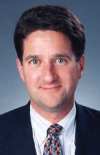Article
Who's Who: Bill Raymond
He once played bass in a Seattle band called the Arrow, but now ATMs rock Bill Raymond's world. As Bank of America's senior vice president of ATM management and development, he has taken a leadership role in making ATMs more accessible to the blind.
October 11, 2001
Bill Raymond says that until he got his first job in banking, he could never imagine himself in the conservative world of business suits, boardrooms and bottom lines. Of course, that was two decades ago, when his idea of a good career move was taking on a new gig playing bass guitar in a Seattle-area band known as "the Arrow."
 |
Today he's responsible for Bank of America's fleet of approximately 13,000 ATMs, and has established himself as a national leader in the banking industry's efforts to comply with regulatory requirements of the Americans with Disabilities Act (ADA). Under Raymond's guidance, the Charlotte, N.C.-based bank has committed to making half its machines accessible to the blind as talking ATMs, a commitment that will likely cost millions of dollars.
Raymond chose banking as a career only after realizing that life as a modestly-talented guitarist wasn't the nirvana it seemed. His band The Arrow was no Nirvana either. He left the world of music behind to join the commercial lending department at Seattle's Seafirst Bank in 1983.
"I thought I'd never fit in, because the banks were way too conservative," Raymond said during an interview in New Orleans, just after giving a well-received keynote address on the ADA issue at Thomson's ATM Conference 2001. "Those were the go-go days of commercial lending."
It's easy to imagine a younger version of the 47-year-old Seattle native taking a different path in life, strumming his bass night after night in a smoky club. Seeing his eyes light up at the mention of a local concert by rocker John Hiatt in New Orleans, his hair just a smidgeon longer than your average banking professional, one knows he's as comfortable talking about the blues as he is about bottom lines.
Bill Raymond:Senior Vice President, ATM Management and Development: Bank of America Birthdate: Dec. 9, 1953 Birthplace: Seattle Residence: San FranciscoEducation: B.A. in medical microbiology from Stanford University, 1976; MBA from the University of Washington Graduate School of Business First Job in Banking: Commercial lender for Seafirst Bank in 1984 Family:Wife Becky, 13-year-old daughter and 10-year-old son Key quote: "If you can't get your story across, you won't get anywhere in corporate America." |
But Raymond's banking career has been anything but average. He embraced the so-called "go-go days" in commercial lending, traveling to a wide range of locales, striking deals throughout the western U.S.
In the late 1980s, after Bank of America acquired Seafirst, Raymond was given the opportunity to oversee ATMs, and he's had that responsibility for 12 years. The growing institution was acquiring banks, and Raymond found himself overseeing a 12-state territory that stretched to Texas and Arkansas. Eventually, in 1993, he was asked to move from Seattle to San Francisco.
He says his rise up the corporate ladder is a direct result of acquiring good communications skills and having the flexibility to change. "There's no substitute for being able to tell your story, both in written form and verbally," he says. "If you can't get your story across you won't get anywhere in corporate America."
His work on talking ATMs has put him in a national leadership position, as evidenced by his keynote address on the issue in New Orleans. He's part of a group of industry leaders organized by the American Banking Association that has met several times with advocacy groups, seeking to find a solution to the ADA requirements.
His leadership style has brought him compliments even from those who might seem likely to oppose the banks' position. Lainey Feingold, a San Francisco-based attorney representing the visually impaired community, has known and worked with Raymond on the issue for years.
"Although we are theoretically on opposite sides of the table, I can honestly say Bill is great to work with," she said. "He is an excellent negotiator, he stays on task, he is straightforward. He has been an industry leader on recognizing the civil rights of blind persons, and for that he deserves significant praise."
His work with the visually impaired community seems to have had a positive effect on Raymond's personal view of the issue as well. While he recognizes that the bank will never make a business case for the money it is investing in ADA compliance, he is quick to say that making ATMs accessible to the blind is the right thing to do.
"The sheer joy of watching a blind person using it is worth the trip," he says.













